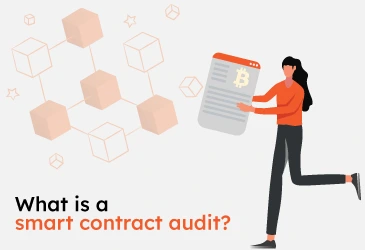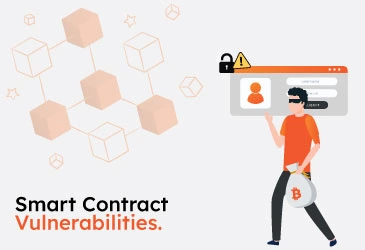How To Audit Smart Contracts
Updated : May 13, 2023

Smart contracts have become increasingly popular over the years as they provide a more efficient way of executing transactions in a decentralized system. However, as the use of smart contracts continues to grow, so does the need to ensure their security and reliability. In this article, we will guide How To Audit Smart Contracts, the best practices, tools, techniques and Smart Contract Auditing that you can use to ensure that your smart contracts are secure and optimized for performance
What Is a Smart Contract Audit?
Before we discuss the process, it is important to know what is a smart contract audit. A smart contract audit is a process of reviewing and analyzing the code of a smart contract to identify vulnerabilities, bugs, and other issues that could compromise its security or reliability. Smart contracts are self-executing programs that run on a blockchain network, and they are used to automate various types of transactions, from financial transactions to supply chain management.
Since smart contracts are immutable, meaning they cannot be changed once deployed, it is essential to ensure they are free from vulnerabilities and bugs before deployment. A smart contract audit involves a comprehensive review of the smart contract code to identify any potential security issues, such as vulnerabilities that could allow hackers to exploit the code and bugs that could cause the contract to fail.
During a smart contract audit, auditors will typically use a combination of manual code review and automated analysis tools to identify any issues in the code. They will also check the smart contract against best practices and industry standards to ensure that it is optimized for security, reliability, and performance.
A smart contract audit is an essential step in developing and deploying smart contracts. By conducting a thorough audit, developers can ensure that their smart contracts are secure, reliable, and optimized for performance, which can help to build trust with users and increase the adoption of blockchain technology.
Why Audit Smart Contracts?
Auditing smart contracts is essential to ensure their security, reliability, and performance. Smart contracts are often used to execute financial transactions, which makes them an attractive target for hackers and malicious actors. By auditing a smart contract, you can identify and fix vulnerabilities before exploiting them.
In addition, auditing smart contracts can help optimize their gas usage, which measures the computational resources required to execute a transaction on the blockchain. Gas usage is directly related to the cost of managing a smart contract, so optimizing it can result in cost savings.
How To Audit a Smart Contract?
Auditing a smart contract is a complex process that requires a combination of technical skills, knowledge of blockchain technology, and expertise in software development. Here are the six steps to auditing a smart contract:
Collect Documentation
The first step in auditing a smart contract is collecting all the relevant Documentation, including the contract's specifications, white paper, and other supporting materials. It's also important to identify any third-party dependencies that the contract relies on.
Automated Testing
The second step is to perform automated Testing of the smart contract's code. This involves using specialized tools to analyze the code and identify potential vulnerabilities or errors. Some tools commonly used for automated Testing include Mythril, Securify, and Oyente.
These tools use various techniques such as symbolic execution, static analysis, and dynamic analysis to identify issues in the code. Automated testing should be done before manual review, as it can save time and provide a good overview of the contract's potential issues.
Manual Review
After performing automated Testing, the next step is to conduct a manual review of the smart contract's code. This involves reviewing the code line by line to identify any issues the automated testing tools may have missed.
It's important to pay attention to edge cases and unusual inputs that could cause the contract to behave unexpectedly. The manual review should also focus on identifying any logical flaws in the code that could lead to security vulnerabilities.
Classification of Contract Errors
Once you've completed the manual Review, the next step is to classify the errors and vulnerabilities you've identified. This involves categorizing them based on their severity, likelihood of exploitation, and potential impact on the contract and its users.
Classifying the errors and vulnerabilities identified in the audit is important for prioritizing which issues need to be addressed first. Categorizing them based on their severity, likelihood of exploitation, and potential impact on the contract and its users can help the development team understand the risks and prioritize fixes accordingly.
Initial Report
After classifying the errors, the next step is to prepare an initial report outlining the issues you've identified and recommendations for addressing them. This Report Report should be shared with the contract's development team so that they can begin working on fixes.
It should outline the issues identified during the audit and provide recommendations for addressing them.
Publish Final Audit Report
The final step is to publish a final audit report once all the issues have been resolved. This Report should summarize the initial findings and recommendations, as well as the steps taken to address the problems. The Report should also provide an overall assessment of the contract's security, functionality, and compliance.
Following these six steps, you can ensure the smart contract you are auditing is secure, functional, and compliant with relevant regulations or requirements. Auditing a smart contract is a complex process requiring a combination of technical skills and expertise, so it's important to work with experienced professionals to ensure the process is completed correctly.
Auditing Best Practices
When auditing smart contracts, it is important to follow best practices to ensure they are secure, reliable, and optimized for performance. Here are some best rules that you should follow:
Security Considerations
- Ensure the smart contract is free from known vulnerabilities, such as reentrancy attacks, integer overflow/underflow, and denial-of-service attacks
- Use secure coding practices, such as input validation, error handling, and exception handling.
- Use up-to-date libraries and frameworks that are free from vulnerabilities
Code Quality and Readability
- Write clear, concise, and readable code.
- Use descriptive variable and function names
- Avoid complex control structures that can make the code difficult to understand.
Gas Optimization
- Use efficient algorithms and data structures to minimize gas usage
- Avoid unnecessary computations and storage operations.
- Use appropriate data types to reduce storage requirements.
Functionality and Business Logic
- Ensure that the smart contract meets the functional requirements of the application.
- Ensure that the smart contract implements the business logic correctly.
Contact Us & Learn About Our Smart Contract Audits Services
Auditing smart contracts is crucial in ensuring blockchain-based applications' security and functionality. By following the six-step process outlined in this article, auditors can identify and address potential vulnerabilities and errors in smart contracts. However, auditing a smart contract requires technical expertise and specialized tools, making it challenging for most individuals and organizations. Well, you do not need to worry. Our team of expert auditors is always there to help you with that.
Along with that, we are always to help you with Custom Blockchain Development and much more. Contact us today and let us ensure the safety and reliability of your blockchain-based applications
Take control of your smart contract security - Request a professional Smart Contract Audit today and ensure the solidity of your blockchain projects
Insights

What Is A Smart Contract Audit?
Smart contracts are self-executing agreements that run on a blockchain network, allowing for secure and decentralized transactions. Smart contracts ...

Smart Contract Vulnerabilities
Smart contracts have revolutionized how we conduct transactions and execute agreements in the digital age. These self-executing programs ...

Smart Contract Audit Checklist
Smart contracts are self-executing agreements with the terms of the agreement between buyer and seller being directly written into lines of code ...